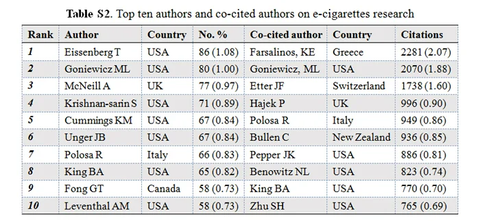
For many years now a lot of authorities have relied upon the “not enough information about e-cigarettes” get out clause.

But is this really true?
A study entitled “Mapping of Global Research on Electronic Cigarettes: A Bibliometric Analysis” seems to disagree with that statement!

For the layman reading this study it does seem to be a massive word salad! It did take my brain a lot of whirring to try and understand what it was on about but I will try and share my interpretation below…
What Did The Study Assess?
This study was conducted to try and round up all the research currently available regarding vaping.

They note that vaping has been widely studied worldwide and a total of 7,979 records were found and analysed. The records date from 2000 to June 2021.
Prior to 2010 there was only sporadic research into the topic but the number of publications has soared since.
Results
The results have various different data sets, there are a lot more in the document but as an example I have shared a few below.
Language Of Publications
The top 10 languages of published studies are:
1.English (98.22%)
2.German (0.61%)
3.French (0.5%)
4.Spanish (0.33%)
5.Italian (0.10%)
6.Portuguese (0.09%)
7.Hungarian (0.08%)
8.Icelandic (0.03%)
9.Polish (0.03%)
10.Japanese (0.01%)

Location Of Studies
The location of studies was analysed and 94 of the countries in the world contributed to all of the publications on e-cigarettes.
The top 10 countries providing research were:
1.USA (59.02%)
2.UK (10.43%)
3.Canada (4.35%)
4.Australia (4.25%)
5.Italy (2.87%)
6.Germany (2.58%)
7.Greece (2.23%)
8.China (2.18%)
9.France (2.07%)
10.South Korea (1.52%)

Institutions
A total of 4,226 institutions contributed to all research articles.
The top 10 are:
1.University California, San Francisco, USA (3.11%)
2.John Hopkins University, UK (2.66%)
3.Virginia Commonwealth University, USA (2.32%)
4.University of Southern California, USA (2.13%)
5.Yale University, USA (2.04%)
6.University of North Carolina, USA (1.84%)
7.University of California, San Diego, USA (1.82%)
8.Kings College London, UK (1.64%)
9.US FDA (Food and Drug Administration), USA (1.58%)
10.University of Waterloo, Canada (1.55%).
Authors
The top 10 authors accounted for 695 publications (8.71% of the total):
1.Eissenberg T, USA (1.08%)
2.Goniewicz ML, USA (1%)
3.McNeill A, UK (0.97%)
4.Krishnan-sarin S, USA (0.89%)
5.Cummings KM, USA (0.84%)
6.Unger JB, USA (0.84%)
7.Polosa R, Italy (0.83%)
8.King BA, USA (0.82%)
9.Fong GT, Canada (0.73%)
10.Leventhal AM, USA (0.73%)

Reaction
As you can guess the findings of this study have been positively received by a lot of vape advocates as it seems to prove there is plenty of information out there!



Conclusions
The paper does state that the USA seems to top most of the results in terms of research with the UK and Australia behind.

But when there is an argument of “not enough data available regarding vaping” – this does seem to be an excuse.
Thankfully more studies are being published daily, but there is a possibility of corrupt or junk studies too, which we must be wary of.
